Food-safe pneumatics automates traditional cheese production.
Contributed by Bill Oliver, Sector Head Food & Beverage/Industrial Automation and John Bridges, Head of Marketing, AVENTICS Corp.
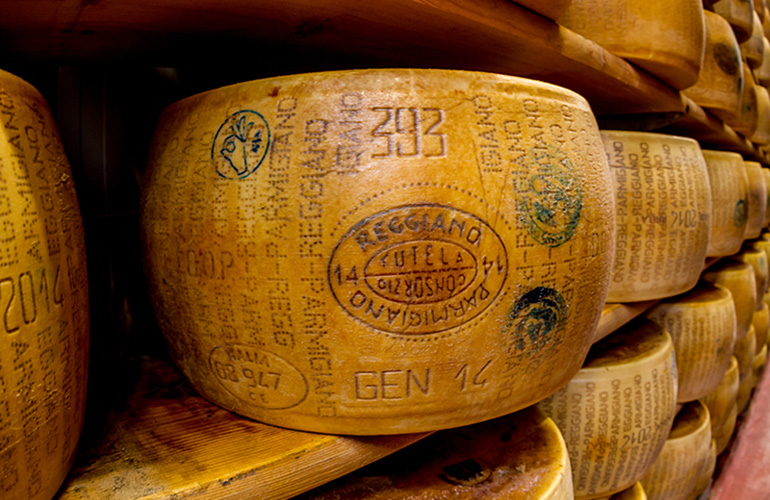
Image courtesy of istockphoto
Most everyone who enjoys a good bowl of pasta is familiar with Parmigiano-Reggiano and Grana Padano, the well-known Italian cheese varieties famous around the world. These types of parmesan cheese have been produced in the Po River region for more than 800 years, and the traditional production process has essentially stayed the same for centuries.
Most people are less aware, however, that crafting these products involves back-breaking manual work. The Italian company Progema Engineering has now automated much of the cheese-making process without compromising traditional methods. A key to mechanized production and handling is the use of pneumatic cylinders and valves from AVENTICS, with headquarters in Laatzen, Germany and U.S. operations based in Lexington, Ky.
Automation meets tradition
Automation technology is increasingly used to ease this difficult task because these cheese varieties not only need a great deal of time, but above all meticulous care. Ingredients are blended based on proprietary recipes and pressing out the whey is a strenuous job. The cheese mixture must first rest for two to three days in round forms called “fascere.” Subsequently, the resulting wheels are repeatedly dipped in brine over the next three weeks. They are then warehoused for at least one year in air-conditioned storage rooms until complete maturity. During the months of this maturation process, the cheese wheels must be carefully and repeatedly turned, cleaned and inspected.
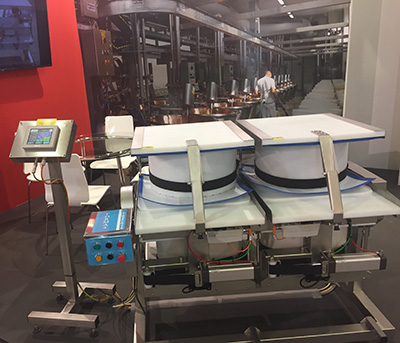
The Forma4 machine, built to rigid Cleaning in Place standards, replaces manual forming and turning of Grana Padano and Parmigiano-Reggiano cheese wheels.
“Often, these tasks are still carried out manually. With the help of our new Forma4 machine, however, producers can automate the process,” explained Alberto Boceda, head of mechanical engineering and co-owner of Progema Engineering S.R.L.
The company, located in Borgo Virgilio southeast of Milan, has 15 employees and specializes in innovative dairy equipment, in particular the design, development and manufacturing of special equipment used to automate cheese production.
This includes automatic storage and cleaning systems that meet Cleaning in Place (CIP) principles for process-engineering systems in the food industry. CIP basically involves equipment and processes that permit cleaning without dismantling equipment and with minimal operator involvement. The goal is to clean product-contact surfaces of processing machinery, vessels and piping. It often involves high-pressure sprays, chemicals and sterilizers, and elevated temperatures. It ensures that equipment is free of dirt, organic contaminants and microorganisms, resulting in high plant hygiene and product safety.
Founded 25 years ago, Progema Engineering has gained extensive expertise with dairy applications and understands that cleanliness and safety are critical. “All components used for our systems have to meet the high standards of the food industry. In addition, we always guarantee that our machines are food-safe, despite customizing them to individual customer’s needs. That’s why we decided to use pneumatic components from AVENTICS when configuring our Forma4 machine for automation,” said Daniele Barbieri, co-owner and head of electrical engineering.
Machine forming and turning
The Forma4 machine adapts 21st-century methods to the forming and turning of Grana Padano and Parmigiano-Reggiano cheese wheels. Pneumatic units built to high hygienic standards perform essential handling functions.
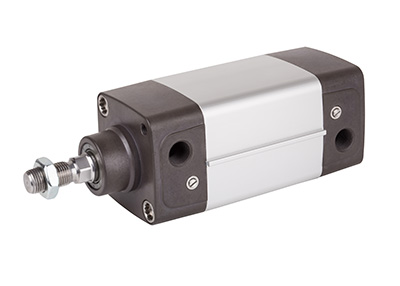
AVENTICS ISO CleanLine cylinders close the round molds and apply appropriate pressure. The air cylinders feature a smooth profile that ensures easy-to-clean hygienic surfaces.
Specifically, corrosion-resistant, double-acting AVENTICS cylinders from the ISO CleanLine (CCL) series close the round molds and ensure that the whey is pressed out by applying the appropriate pressure. Later, when the cheese wheels are turned, the cylinders keep the molds under tension.
AVENTICS CL03-EV valves regulate movements and mount directly on the cylinders. The CL03-EV valves are ideal for such applications due to their tailored design and the high IP69K protection class.
AS5 series maintenance units—modular filter-pressure regulator-lubricator combos that round out the complete, installed pneumatic system—provide 5 µm filtration and ensure proper compressed-air preparation for efficient production.
Food-friendly pneumatics
“The Clean Line concept from AVENTICS immediately convinced us,” confirmed Boceda. He also lists the consultation and integration of the pneumatic specialists during the construction phase of the new system as deciding factors in the selection process. “In cheese production, all components must comply with premium standards and endure countless cleaning sequences. Therefore, the right choice of components and their materials is just as important as the use of hygienic components that are easy to service, clean, disinfect and maintain,” he said.
AVENTICS long-term expertise in the design of hygienic components plays a key role, demonstrated by the special features of the “best-in-class” components, which have been especially designed for optimal food safety. This means: no indentations or sharp edges, use of food-grade materials and lubricants, as well as high resistance to chemicals and corrosion. The overall design facilitates cleaning, disinfecting, and sterilizing of the machine, thus reliably preventing the risk of microbial contamination.
Series CCL CleanLine air cylinders meet ISO 15552 and ISO 21287 standards and feature a smooth profile that ensures easy-to-clean hygienic surfaces. The design minimizes potential pocket areas where dirt and contaminants can collect, making them ideal for washdown applications and other packaging or handling operations.
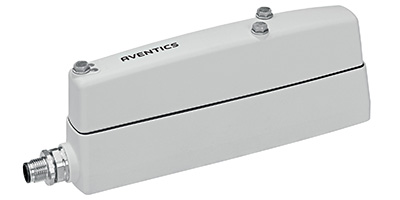
The CL03-EV valves regulate cylinder movements. The IP69K-rated units have no indentations that could trap particles and are specifically designed to handle high-pressure washdown applications.
They are available in two versions. Standard CCL-IS series cylinders (ISO 15552) come in bore sizes from 25 to 125 mm bore and maximum stroke of 2,800 mm (double acting) and 1,500 mm (through piston rod). They’re built with anodized-aluminum end covers and tube, stainless steel piston rod and tie rods, a polyester scraper, and use ISO 21469 (NSF-H1) lubricants.
They have a rated operating pressure of 1.5 to 10 bar (22 to 147 psi) and temperature range of -20° to 80° C (-4° to 176° F). A magnetic piston is standard. The CCL-IS cylinders also feature “Ideal Cushioning” capability that minimizes both deceleration time and end-of-stroke impact, and as a result helps increase equipment productivity and reduce maintenance requirements. Related CCL-IC cylinders (ISO 21287) come in 16 to 100 mm bores and maximum strokes to 500 mm in double-acting versions and 16 to 63 mm for single-acting products.
The CL03 Clean Line series of pneumatic directional control valves are specifically designed to handle high-pressure (100 bar) washdown applications. The units are designed such that there are no indentations that could trap particles. The cover and base plate are made of fiberglass-reinforced polyamide to resist detergents and aggressive chemicals.
A hydrogenated acrylonitrile butadiene rubber (HNBR) seal prevents ingression between cover and base. This material handles higher temperatures than do nitrile rubbers and has excellent resistance to many chemicals, steam, hot water and ozone.
CL03 (Clean Line) directional valves have a zero-overlap spool design. Working pressure is up to 10 bar and they handle ambient temperature from 0° to 50° C (32° to 106° F). The units are available as standalone single valves (CL03-EV version) with nominal flow of 700 lpm; or in manifolds of up to 16 valves that, depending on the size, can handle flows of up to 1,100 lpm.
Typical switch time for the CL03 is 16 msec on and 25 msec off. The valves are available with multipin electrical connections, or can be configured to support various fieldbus protocols. Serial communication options for industrial networking permit advanced diagnostic capabilities.
Customized systems
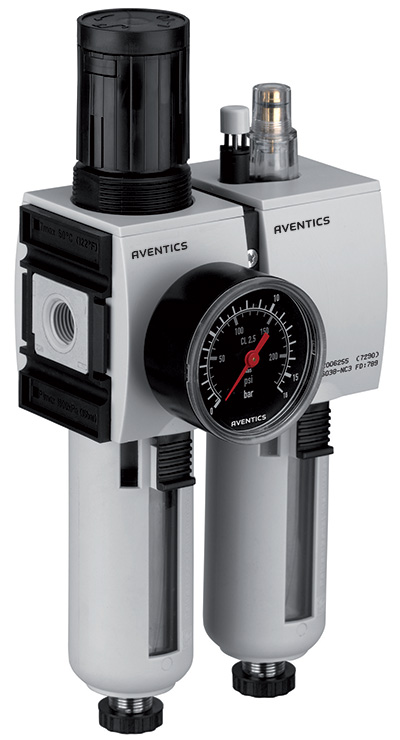 Thanks to their protection against high-pressure water and steam jet cleaning and a hygienic design, Progema Engineering can install the individual CL03-EV in decentralized locations. Mounting them directly on the actuators, rather than remotely in a protective control cabinet, reduces the lengths of the compressed air lines and minimizes the volumes to fill each cycle. That, in turn, means lower air consumption and pressure losses and faster cycle times, thus increasing machine efficiency and throughput.
Thanks to their protection against high-pressure water and steam jet cleaning and a hygienic design, Progema Engineering can install the individual CL03-EV in decentralized locations. Mounting them directly on the actuators, rather than remotely in a protective control cabinet, reduces the lengths of the compressed air lines and minimizes the volumes to fill each cycle. That, in turn, means lower air consumption and pressure losses and faster cycle times, thus increasing machine efficiency and throughput.
Progema Engineering uses individual valves in the Forma4. “The modular valve system offers countless possibilities, and this solution corresponds exactly to our requirements in the standard machine. However, depending on the need and specific end-use in a dairy, we can easily expand the CL03,” said Barbieri.
The mold-turning device equipped with AVENTICS pneumatics is one of the components of the automatic warehouse system that Progema Engineering offers its customers. The modern system with several storage levels requires significantly less space, facilitates access to the molds, and creates ergonomic workplaces with individual height settings.
As an optional supplement to this modular, expandable concept, customers can use the Forma4 device for further automation. In the production of Grana Padano and Parmigiano-Reggiano, the Forma4 machine is used on the first day to remove the excess whey and form the cheese shapes. In further steps, the cheese is repeatedly immersed in brine for 21 days, followed by seasoning in the last phase.
“The regular turning of the approximately 40-kilogram cheese wheels is not an easy task and can quickly lead to back pain in employees. Instead, our automatic turning device takes over this monotonous, heavy-duty work and completely eliminates that problem,” emphasized Barbieri.
This makes the Forma4 turning device a sensible investment—especially considering that about 3 million wheels of Parmigiano-Reggiano and about 5 million wheels of Grana Padano cheese are produced in the region of origin each year.
AVENTICS Corp.
aventics.com/us
Filed Under: Pneumatic Tips
